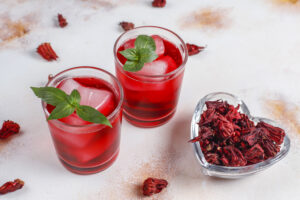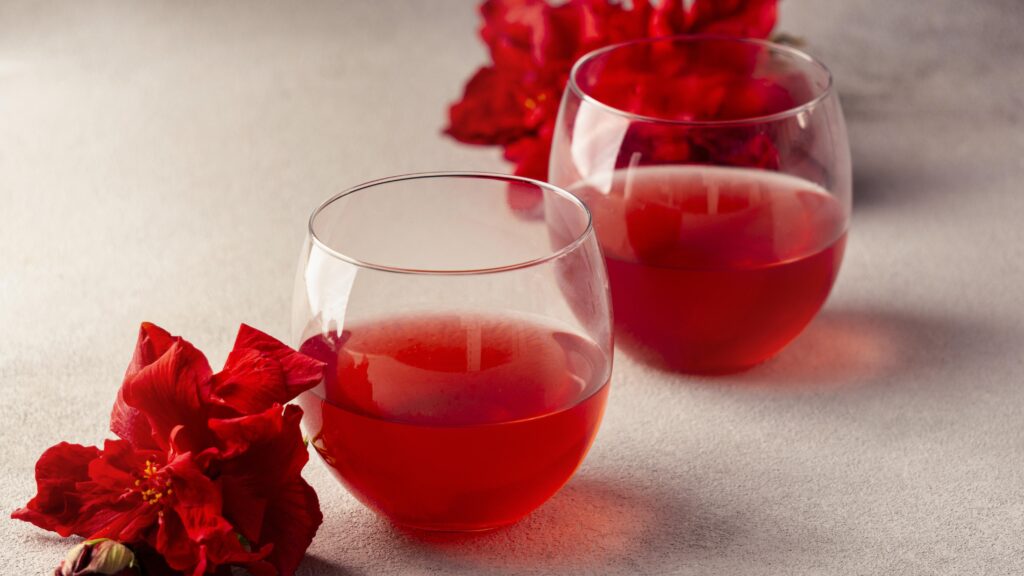The Benefits of Hibiscus

In the world of natural remedies, few plants offer as many potential benefits as the hibiscus. This vibrant flower isn’t just a feast for the eyes; it’s a treasure trove of goodness for your health, skin, and hair. Let’s delve into the world of hibiscus benefits and discover how this simple yet extraordinary flower can transform your life.
Benefits of Hibiscus: A Nutrient-Rich Marvel
Hibiscus, with its scientific name Hibiscus sabdariffa, is more than just a pretty flower; it’s a nutritional powerhouse. This section will explore the abundant nutrients found in hibiscus and how they contribute to your overall well-being.
Rich in Vitamin C
Vitamin C, also known as ascorbic acid, is an essential nutrient for the body. Hibiscus is teeming with this vitamin, making it a natural source of immune support. Vitamin C plays a crucial role in:
Boosting Immunity: It enhances the production of white blood cells, which are your body’s defense against infections and illnesses.
Collagen Production: Vitamin C is essential for collagen synthesis, a protein that keeps your skin, hair, and nails healthy and youthful.
Antioxidant Power: As an antioxidant, it helps combat free radicals, which are unstable molecules that can damage cells and lead to chronic diseases.
Antioxidant Abundance
Hibiscus is particularly rich in antioxidants, including flavonoids and anthocyanins. These compounds are known for their potent antioxidant properties. Antioxidants are like the body’s natural defense system against oxidative stress, which is a leading cause of aging and various diseases.
The antioxidants in hibiscus can help:
Fight Premature Aging: By neutralizing free radicals, hibiscus can help reduce the signs of aging, such as wrinkles and fine lines, and promote a youthful complexion.
Protect Heart Health: Antioxidants in hibiscus have been linked to lower blood pressure and reduced cholesterol levels, which are crucial for heart health.
Prevent Chronic Diseases: Regular consumption of hibiscus may contribute to a reduced risk of chronic diseases, including heart disease and certain types of cancer.
Benefits of Hibiscus for Minerals for Health
In addition to vitamins and antioxidants, hibiscus contains essential minerals that support various bodily functions:
Iron: Iron is vital for the production of hemoglobin, the protein responsible for transporting oxygen in your blood. A sufficient iron intake can help prevent anemia and promote overall energy levels.
Magnesium: This mineral is crucial for muscle and nerve function, blood glucose control, and bone health. Hibiscus can be a valuable source of magnesium in your diet.
Calcium: Although not as abundant as in dairy products, hibiscus does contain calcium, which is important for bone health, muscle function, and nerve signaling.
Potassium: Hibiscus also provides potassium, a mineral essential for maintaining proper heart and muscle function, as well as regulating blood pressure.
Benefits of Hibiscus for Digestive Health
Fiber is another benefit of hibiscus. Adequate fiber intake is essential for digestive health. It helps prevent constipation, promotes regular bowel movements, and supports a healthy gut microbiome. If you’re looking to improve your digestive wellness, incorporating hibiscus into your diet can be a tasty and natural way to do so.
In summary, “Benefits of Hibiscus: A Nutrient-Rich Marvel” showcases the incredible nutritional profile of hibiscus. Its abundance of vitamin C, antioxidants, and minerals can boost your immune system, protect against oxidative stress, and support various aspects of your health. Whether you enjoy it as a refreshing tea, incorporate it into your skincare routine, or use it for its hair-enhancing properties, hibiscus is a versatile and beneficial addition to your daily life.
Hibiscus Benefits for Skin

A Glowing Complexion
One of the standout advantages of hibiscus for your skin is its ability to promote a radiant complexion. This is primarily due to its rich content of antioxidants, including vitamin C and various flavonoids.
Free Radical Defense: Antioxidants are your skin’s best friends when it comes to maintaining a youthful appearance. They work by neutralizing harmful free radicals, which can damage your skin cells and accelerate the aging process.
Even Skin Tone: Hibiscus can help even out your skin tone and reduce the appearance of dark spots and blemishes, giving you a smoother and more luminous complexion.
Anti-Inflammatory Properties: Hibiscus also possesses anti-inflammatory properties, which can calm irritated skin and reduce redness, making it an excellent choice for those with sensitive or acne-prone skin.
Benefits of Hibiscus for Acne Treatment and Prevention
For those who struggle with acne, hibiscus offers a natural remedy that can be a game-changer for your skincare routine.
Gentle Exfoliation: Hibiscus contains natural alpha hydroxy acids (AHAs), such as citric acid and malic acid. These AHAs exfoliate the skin by dissolving dead skin cells, unclogging pores, and preventing acne breakouts.
Benefits of Hibiscus for skin Oil Control: Hibiscus can help balance the skin’s natural oil production, making it suitable for those with oily or combination skin types.
Antibacterial Properties: The flower’s natural antibacterial properties can help combat the bacteria that contribute to acne formation.
Benefits of Hibiscus for An Anti-Aging Elixir
As you age, your skin naturally undergoes changes, including the loss of collagen and the formation of wrinkles. Hibiscus can be a valuable ally in your quest for youthful skin.
Collagen Boosting: Hibiscus is known to contain compounds that inhibit the breakdown of collagen, the protein responsible for maintaining skin elasticity. This can result in firmer, more youthful-looking skin.
Hydration: Proper hydration is key to preventing premature aging. Hibiscus can help retain moisture in your skin, keeping it supple and less prone to wrinkles.
How to Incorporate Hibiscus into Your Skincare Routine
Now that you know the benefits, you may be wondering how to harness hibiscus for your skincare regimen. Here are some ways to do so:
Hibiscus Face Masks: Creating a homemade hibiscus face mask is a popular option. Simply mix hibiscus powder or crushed dried hibiscus petals with yogurt or honey for a soothing and revitalizing mask.
Hibiscus-infused Serums: Some skincare brands offer serums and creams infused with hibiscus extracts. These products can be a convenient way to incorporate the flower’s benefits into your daily routine.
DIY Hibiscus Toner: Brew a strong hibiscus tea, let it cool, and use it as a toner to refresh and tone your skin.
Hibiscus in Cleansing Regimens: Some cleansers contain hibiscus extracts to help exfoliate and cleanse the skin gently.
Incorporating hibiscus into your skincare routine can help you achieve and maintain healthy, glowing skin. Its natural properties make it a versatile and effective addition to your beauty regimen, whether you’re combating acne, aiming to reduce the signs of aging, or simply seeking a radiant complexion.
Benefits of Hibiscus for Hair
Just as hibiscus nourishes your skin, it can also promote lustrous, healthy hair.
Benefits of Hibiscus for Hair Growth
Nourishing Hair Growth
If you’re dreaming of long, luscious locks, hibiscus might just be the secret ingredient your hair care routine needs.
Stimulating Hair Follicles: Hibiscus is known to stimulate hair follicles, promoting hair growth. The flower is rich in vitamins and amino acids that nourish the scalp and encourage the growth of healthy, strong hair.
Preventing Hair Loss: Regular use of hibiscus-based hair treatments can help reduce hair breakage and prevent hair loss. This is particularly beneficial for those experiencing thinning hair or dealing with hair loss issues.
Conditioning Effect: Hibiscus leaves and flowers are natural conditioners, making your hair softer and more manageable. They can also add a natural shine to your locks.
Benefits of Hibiscus for Repair and Strengthen
Damaged hair can be a source of frustration and concern. Hibiscus can come to the rescue with its rejuvenating properties.
Repairing Damaged Hair: Hibiscus has natural emollient properties that can help repair and strengthen damaged hair. This makes it an excellent choice for those with dry, brittle hair or split ends.
Amino Acids: Amino acids found in hibiscus help nourish and strengthen the hair shaft, reducing the risk of breakage and promoting healthier, more resilient hair.
Maintaining Scalp Health
Healthy hair starts with a healthy scalp, and hibiscus can play a role in achieving and maintaining scalp wellness.
Benefits of Hibiscus for Balancing Scalp Oils: For individuals with oily scalps, hibiscus can help balance oil production, reducing the risk of greasy hair.
Soothing Scalp Irritation: Hibiscus has anti-inflammatory and cooling properties that can soothe scalp irritation, itching, and redness.
How to Incorporate Hibiscus into Your Hair Care Routine
Now that you know the benefits of hibiscus for hair, here are some ways to make the most of this natural wonder:
Hibiscus Hair Mask: Create a hair mask by blending hibiscus leaves and flowers with coconut oil or yogurt. Apply this mixture to your hair and scalp, leave it on for about 30 minutes, and then rinse thoroughly. This can help nourish your hair and promote growth.
Hibiscus Oil: Infuse coconut or olive oil with dried hibiscus petals. Apply this oil to your hair and scalp for a deeply conditioning treatment. Leave it on for a few hours or overnight before washing it out.
Hibiscus Shampoo and Conditioner: Look for commercial shampoos and conditioners that contain hibiscus extract. These products are convenient for daily use and can help you reap the benefits without any DIY effort.
Hibiscus Tea Rinse: After washing your hair, use cooled hibiscus tea as a final rinse. It can add shine and luster to your locks.
Incorporating hibiscus into your hair care routine can be a luxurious and effective way to achieve and maintain strong, healthy, and beautiful hair. Whether you prefer DIY treatments or commercial products, hibiscus offers a natural solution for various hair concerns, from hair growth to damage repair and scalp health.
Benefits of Hibiscus Tea: A Delicious Route to Wellness

The Pleasures of Hibiscus Tea
Hibiscus tea, often referred to as “roselle tea” or “sour tea,” is more than just a beverage; it’s a journey into flavor and wellness. This vibrant, ruby-red elixir is celebrated for its tart and tangy taste, making it a refreshing choice for tea lovers. But beyond its deliciousness, hibiscus tea offers an array of health benefits that can transform your well-being.
Benefits of Hibiscus for Aids in Weight Management
If you’re looking to shed a few pounds or maintain a healthy weight, hibiscus tea can be a valuable addition to your dietary routine.
Metabolism Boost: Hibiscus tea has been linked to increased metabolism, which means your body can burn calories more efficiently.
Reduces Fat Absorption: The tea contains compounds that inhibit the absorption of dietary fats. This can help you manage your weight more effectively.
Appetite Control: Some studies suggest that hibiscus tea may have an appetite-suppressing effect, which can be beneficial for those aiming to control their calorie intake.
Benefits of Hibiscus for Stress Reduction and Relaxation
In today’s fast-paced world, stress and anxiety can take a toll on our mental and physical well-being. Hibiscus tea can provide a moment of tranquility in your day.
Calming Properties: A warm cup of hibiscus tea can have a calming effect on your nerves, reducing stress and promoting relaxation.
Improved Sleep: By reducing anxiety and promoting relaxation, hibiscus tea may contribute to better sleep quality, helping you wake up feeling refreshed.
Benefits of Hibiscus for Heart Health Booster
Your heart is the engine that keeps your body running smoothly, and hibiscus tea can help maintain its health.
Benefits of Hibiscus for Lowers Blood Pressure: The antioxidants in hibiscus tea have been shown to help lower blood pressure, making it beneficial for those with hypertension.
Benefits of Hibiscus for Reduces Cholesterol: Regular consumption of hibiscus tea can lead to reduced levels of LDL (bad) cholesterol, lowering the risk of heart disease.
How to Enjoy Hibiscus Tea
Hibiscus tea is not only beneficial but also incredibly easy to prepare. Here’s how you can make the most of this wellness elixir:
Hibiscus Tea Bags: Many stores offer hibiscus tea bags, making it as convenient as brewing any other tea. Simply steep a bag in hot water for a few minutes, and your cup of health and flavor is ready.
Loose Dried Hibiscus Flowers: You can also opt for loose dried hibiscus flowers, which can be steeped in hot water just like tea bags. You can adjust the strength of the tea to your preference by adding more or fewer petals.
Iced Hibiscus Tea: Hibiscus tea can be enjoyed both hot and cold. For a refreshing twist, prepare it as an iced tea by cooling it in the fridge or adding ice cubes.
Hibiscus Blends: Some tea brands offer blends that combine hibiscus with other herbs and flavors, enhancing both the taste and the health benefits.
Incorporating hibiscus tea into your daily routine can be a delicious and delightful way to enhance your overall wellness. Whether you savor it for its weight management benefits, stress-relieving properties, or heart-healthy advantages, each sip of hibiscus tea takes you on a journey to a healthier, happier you. Embrace the tart, tangy allure of hibiscus tea and embark on a route to wellness that’s as enjoyable as it is beneficial.
Conclusion
Incorporating hibiscus into your daily routine can bring a host of benefits for your health, skin, and hair. Whether you choose to enjoy it as a tea, incorporate it into your skincare routine, or create DIY hair masks, the power of hibiscus is undeniable. Unlock the potential of this vibrant flower and bloom with vitality and beauty.
FAQs
- Can hibiscus help with weight loss?
Yes, hibiscus tea can aid in weight management by boosting metabolism and reducing fat absorption.
- How can I use hibiscus for my hair?
You can make a hair mask by blending hibiscus leaves and flowers with coconut oil and applying it to your hair.
- Is hibiscus suitable for all skin types?
Hibiscus is generally suitable for all skin types, but it’s best to do a patch test if you have sensitive skin.
- How often should I drink hibiscus tea for maximum benefits?
Drinking hibiscus tea 2-3 times a day is recommended for maximum benefits.
- Are there any side effects of consuming hibiscus?
Hibiscus is safe for most people when consumed in moderation. However, excessive consumption may lead to upset stomach in some individuals.
- Can hibiscus really reduce wrinkles?
Yes, the antioxidants in hibiscus can help reduce the appearance of wrinkles over time.

